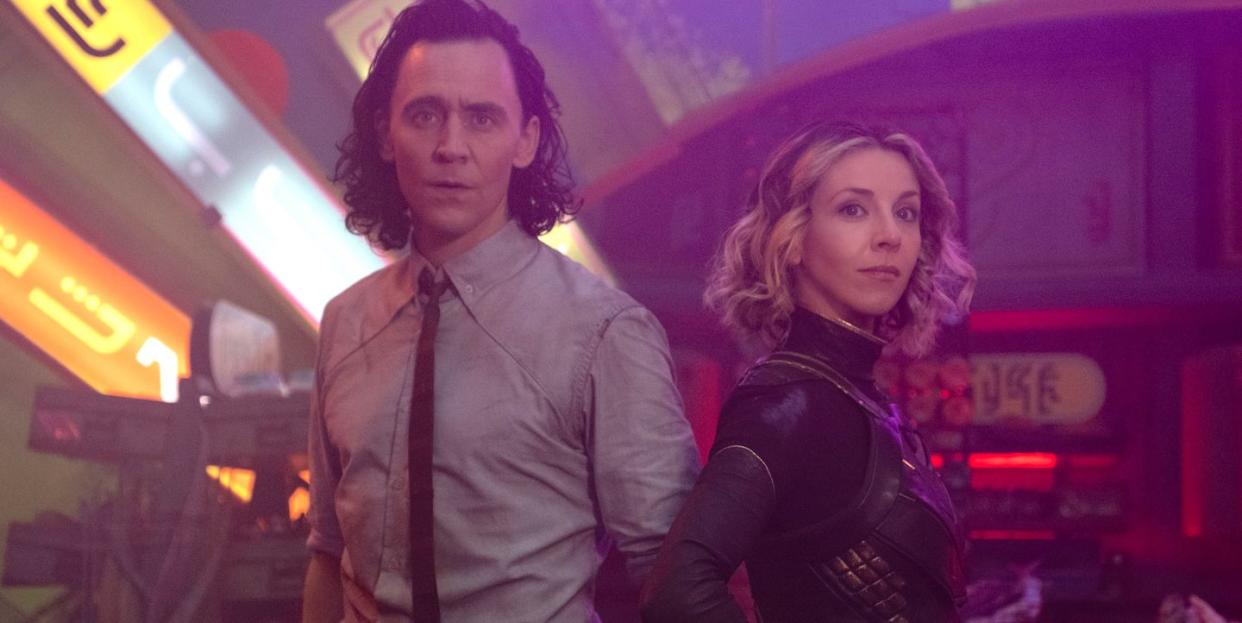Why Loki's Sylvie Could Potentially Split Open Marvel's Multiverse

Love is complicated. The third episode of Marvel's Loki, “Lamentis,” attempts to set this predicament forth via a set of milquetoast metaphors—i.e. “Love is hate,” “Love is a dagger”—but the point nevertheless seeps through: To be loved is to be known, and to be known is to be vulnerable. To be vulnerable is to be in danger. So, as the Marvel logic goes, love must be dangerous—and therefore avoided. Like Tom Hiddleston's Loki, Sylvie (Sophia Di Martino), Loki's new anti-heroine, appears to have experienced her fair share of heartbreak. Thus why, when Loki seems prepared to pour his heart out to her in episode 4, she's caught unawares.
Sylvie, as identified by the show's looming overseers, the Time Variance Authority, is a Loki “variant.” By the organization's description, she's an erroneous version of the “real” Loki that exists along the mythological Time-Keepers' Sacred Timeline. The TVA foot soldiers make these “variants” out as troublesome annoyances, meant to be erased so as to prevent the universe from stumbling into a multiverse of madness. But one such variant has long evaded their capture, and the fugitive in question is revealed as Sylvie, a Loki variant who loathes being referred to as “a Loki.”
That's because, as we learn in episode 3, “Lamentis,” Sylvie has an appearance and a personality that diverges wildly from Loki (Tom Hiddleston)'s own. The TVA has led us (and Loki) to believe that variants are unnecessary, half-baked spin-offs of an authentic Patient Zero. But the small secrets Sylvie lets slip in episode 3 reveal that she in fact lived a full life before the Loki we know showed up—and perhaps she's just as entitled to it as the real deal.
Yet Sylvie, like the love for which she waxes poetic, is complicated. As an audience, we can't be sure she's who she presents as. We know a little about her history, but she remains a cipher until we dig deeper.
So who is she? There's a few different possibilities. Let's break them down.
It's possible Sylvie is simply a Loki variant.
There's a significant chance this Sylvie is who the TVA says she is: A rogue Loki with blonde curls. We know she was adopted by Asgardians like Hiddles-Loki, though she knew her true heritage long before he did. Marvel might be throwing audiences a bone by naming her “Sylvie” as a nod to the comics, but perhaps they're planning to yank the excitement back, à la Ralph Bohner in WandaVision, by the end of the show. It would certainly keep things simpler.
We learn in episode 4 that she remembers her time on Asgard, and she was plucked from her childhood home by Ravonna Renslayer, charged with “crimes against the Sacred Timeline.” But, even as a small child, she was tricky enough to literally escape Ravonna's grasp, nabbing the enforcer's TemPad and leaping from timeline to timeline, hiding in apocalypses well into her adolescent and adult years.
What this doesn't explain, though, is why she adopted the name “Sylvie.” Perhaps it's an Easter egg monicker, sure. But let's look at the other option.
Sylvie could be a version of Sylvie Lushton, aka the second Enchantress.
It's possible that Sylvie Laufeydottir, as the series names her, is a spin-off of Sylvie Lushton, aka Marvel Comics's second Enchantress.
In the comics, Sylvie Lushton was a young (mortal) girl living in Oklahoma when the Asgardians took over part of the state as their new homeland, following an apocalyptic Ragnarok event. (Sound familiar?) She was gifted magical powers by Loki himself and eventually joined up with the Young Avengers in New York City—an interesting tidbit, given that several Young Avengers, including Billy Kaplan, Tommy Shepherd, Kate Bishop, and America Chavez have already appeared or are confirmed to appear soon in the MCU. Sylvie Lushton took up the mantle of Enchantress, once held by an Asgardian villain named Amora.
It's unlikely that Loki's Sylvie will have a backstory that mirrors the comics precisely. But keep that Ragnarok bit in mind. It's altogether possible that our Sylvie's musings on love “as hate” could have stemmed from post-apocalyptic trauma. Maybe, as she was jumping from apocalypse to apocalypse in her youth, she landed on Asgard's own. Maybe she's even fighting the TVA as a way of reversing her own homeworld's death.
Sylvie could be a former TVA member.
This option seems unlikely, given Sylvie's insistence that she's spent most of her life fleeing the TVA while growing up during the end of many worlds. But she is the trickster goddess; perhaps it's all a ruse.
In that case, she could be a former TVA employee herself. In Loki's episode 3, Sylvie lets loose a shocking piece of information: All the TVA minutemen are variants. This means Mobius (Owen Wilson) is unaware of the fact that, rather than being created by the Time-Keepers for a purpose, he's being used by them—as an involuntary detective-cum-soldier. When he learns the truth in episode 4, he's rattled enough to rebel. Maybe Sylvie herself experienced a similar awakening in her teenage years.
Sylvie is clearly disillusioned with the Time-Keepers; she wants to shake the Sacred Timeline. But why would she have such an urgent vendetta, other than to save her own skin? And how could she possibly know that the TVA crew are all variants, if she didn't have insider information? After episodes 3 and 4, “Laurentis” and “The Nexus Event,” it seems possible that Sylvie once drank the proverbial TVA Kool-Aid herself, only to realize she was servicing an organization bent on her destruction. Loki seems intent on inching the TVA further and further into villain territory.
So is Sylvie an actual Loki, or is she merely living la vida Loki? We can't be sure yet. But her showdown with Ravonna could spell the end of the Sacred Timeline—and split open the multiverse.
You Might Also Like

